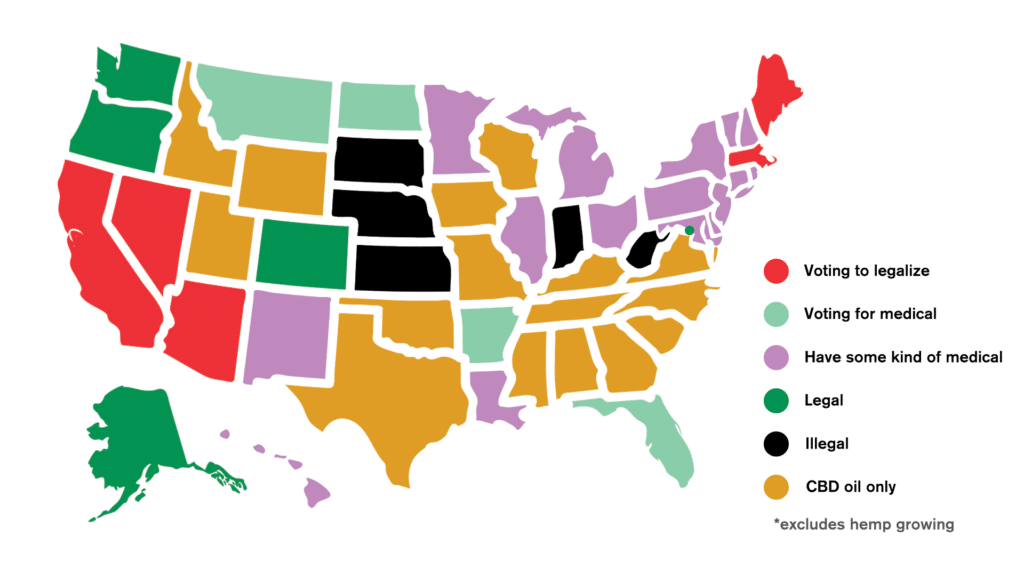Mapping Marijuana Legalization
Five states have full legalization initiatives on the ballot. Four will be voting on medical cannabis. Here is a rundown of what each initiative aims to do.

Psymposia is a 501(c)(3) nonprofit research and media organization that offers critical perspectives on drugs, politics, and culture. We rely on contributions from our readers and listeners. Your support is vital to sustaining Psymposia.
Support Psymposia’s independent journalism on Patreon and help us drive the Mystery Machine! We’re a bunch of meddling kids who are unmasking the latest shenanigans on the psychedelics beat.
Marijuana laws can be confusing. We encourage you to read more here and here.
November is appearing to be one of the most momentous months in voting history. Not only will we be punching ballots for our next president, some states have rolled up cannabis legalization initiatives. Though our country is divided over their two major presidential options, Americans agree on one thing – cannabis.
A Quinnipiac poll this year showed that over 80% of voters are in support of medical marijuana, and a Gallup poll showed a 58% approval for legal adult use. California, Maine, Massachusetts, Nevada, and Arizona all have full legalization initiatives on the ballot. Montana, North Dakota, Arkansas, and Florida will be voting on medical cannabis.
If these states pass, more than half of our union will have legal medical cannabis, and nine states plus Washington D.C will allow legal adult-use. This could be a tipping point, putting that much more pressure on the federal government to change our draconian drug laws.
Jake Plowden, cofounder of the Cannabis Cultural Association says, “If the major states like (Mass, Maine, Cali, Florida) pass I definitely see a domino effect ensuing soon afterwards in states like New York, Connecticut, Virginia, Vermont, and Tennessee. I hope that people also understand the social justice ramifications of cannabis legalization. Not only should there be a conversation about the progression of cannabis legalization but also of inclusion and re-education.”

Below is a rundown of what each initiative aims to do:
California’s Prop 64
All eyes are on California. With nearly 40 million people, or 10% of America’s total population, this could be a YUGE win for the movement. If the Adult Use of Marijuana Act passes, or Proposition 64, it would make adult-use of cannabis fully legal along the entire west coast. Adults 21 years and older can possess up to an ounce of cannabis, purchase cannabis from licensed retailers, and grow up to six plants for personal use.
Individual municipalities have the ability to limit or ban commercial cannabis operations, and even set local tax rates. A 15% excise tax on sales, in addition to a cultivation tax of $9.25 per ounce of flower and $2.75 per ounce of trim/leaves, will be used to pay for the initiative. Backers of the proposition estimate over $1 billion in annual tax revenue for the state of California. Additional funds will go towards youth substance abuse prevention, medical cannabis research, environmental protection and remediation, and local governments. A shining provision, the initiative allocates resources towards economic development and job placement in neighborhoods most in need, and allows current cannabis sentences to be reduced and previous convictions expunged.
Maine’s Question 1
Maine’s bill is hailed as one of the most liberal measures created to date. Due to this, it was embroiled in some controversy. Question 1 will legalize possession of 2 ½ ounces of cannabis, and home grows of six flowering and twelve non-flowering plants for adults over 21. The department of Agriculture, Conservation and Forestry will be the regulatory body for the cultivation, manufacture, distribution, and sale of cannabis.
The initiative has a 10% excise tax on sales, which goes directly to Maine’s general fund. It also sets up the licensure of retail social clubs! Anyone over 21 will be able to buy and consume cannabis on the premises.
Massachusetts Question 4
Similar to Maine, Mass. had lawsuits alleging that petition signers were misled on whether or not the initiative would allow the sale of edibles and concentrates. The lawsuits were eventually shut down in the state’s supreme court.
Question 4 will allow adults over the age of 21 to possess up to an ounce of cannabis in public, ten ounces at home, and allows home cultivation of 6 plants. A 3.75% excise tax will be added onto the 6.25% sales tax. Like many of the similar initiatives, it doesn’t allow for public consumption of marijuana. A strong regulatory body around the testing and packaging of cannabis will be created in an effort to keep consumers safe.
Massachusetts will also give individual municipalities power over local taxes and bans on commercial cannabis operations.
Arizona Proposition 205
Arizonians showed their seriousness about legalizing cannabis by handing in 250,000 signatures to the Arizona’s Secretary of State office. However, once again prohibitionists looked to stop the initiative through a lawsuit. They said the petitions didn’t give all the details on the initiative. After moving all the way to the state’s supreme court, the lawsuit was struck down. Social Justice Warriors – 1, Prohibitionists – 0.
Prop 205 legalizes cannabis possession of up to an ounce, and personal cultivation of up to 6 plants for adults 21 and older. The Department of Marijuana Licenses and Control will be created to oversee licensing of cannabis retail stores, cultivation, manufacturing, and testing facilities.
The 15% sales tax is higher than some of the other initiatives, but the money is being allocated towards school construction, full-day kindergarten programs, public drug education, and the regulatory system itself.
Nevada Question 2
Nevadians were well prepared in getting their initiative approved for the ballot in 2014. Adults over the age of 21 will be able to possess up to an ounce of cannabis, and the bill allows home cultivation of six plants for those who don’t live within 25 miles of a retailer. A 15% excise tax will be used to fund schools and the regulatory agencies responsible for overseeing the program.
The initiative places restriction on the number of retailers allowed in each county. Clark county, home to Las Vegas, will be allowed up to 80 shops, while every other county with a population of less than 55k can have no more than two shops.
Florida Amendment 2
Amendment 2 is making the push for the legalization of medical cannabis. Similar to New York, the Department of Health (DOH) will be in control of the system as a whole. They’ll regulate and register centers that produce and distribute medical cannabis. Patients and caregivers will apply for their identification cards through the DOH as well.
The amendment’s qualifying conditions are HIV, AIDS, PTSD, ALS, Crohn’s Disease, Parkinson’s Disease, multiple sclerosis, and other debilitating diseases as approved by a physician.
Unfortunately, Florida constitutional amendments require 60 percent of voters’ approval to pass. In 2014, the amendment was less than 3% short of approval.
Arkansas Issue 6 & Issue 7
Arkansas has two initiatives on the ballot this November. Arkansas Medical Marijuana Amendment, or Issue 6, allows patients with debilitating conditions to get certification from their doctors to buy medical cannabis. It sets up an independent commission that will award licenses for eight grow facilities and up to 40 for-profit dispensaries throughout the state. Patients won’t be allowed to grow at home.
The Arkansas Medical Cannabis Act (Issue 7) allows certified patients to obtain cannabis from non-profit compassion centers. For every 20 pharmacies, there cannot be more than one “cannabis care center.” If a patient doesn’t live within 20 miles of a center, they may apply for a home grow certification that allows up to 10 plants. The Department of Health provides oversight, funded entirely by the taxation on cannabis.
Montana Issue 24 (1-182)
1-182 is essentially an expansion on the medical cannabis program that passed in 2004. The proposal would get rid of the original limit that restricted medical cannabis providers to just three patients. It also does away with unannounced inspections and the physician reviews required for certification. The qualifying conditions will also be expanded to include PTSD and chronic pain.
A major part of the bill could be delayed by months because of a clerical error. When two new sections were added to the bill, the dates in which the measures would take effect weren’t updated. For example, the expansion of the number of patients allowed for providers won’t take effect until June 30th. This could leave as many as 12,000 patients without viable medicine for months.
North Dakota Measure 5
The North Dakota Compassionate Care Act will legalize medical cannabis for conditions such as AIDS, cancer, hepatitis, glaucoma, ALS, epilepsy, and other debilitating diseases. Patients will be allowed to possess up to three ounces of cannabis.
As many other medical cannabis initiatives, Measure 5 puts the Department of Health in power. They will issue ID cards for patients and regulate nonprofit compassion centers which act as dispensaries. Home cultivation will only be allowed if a patient resides more than 40 miles from a center. This could leave many patients relying on able-bodied caregivers to get their medicine.
The Movement
Why should you vote yes? According to the Drug Policy Alliance, more than 700,000 people are arrested for cannabis related “crime” each year in America. The war on drugs infringes upon our fundamental rights to free speech and protection from unreasonable search and seizure. We know that in general our drug laws are enforced inequitably. Though African Americans make up only 13% of our total population, they make up 40% of all non-violent drug arrests.
Not only does cannabis legalization offer hope for healing the communities most devastated by the war on drugs, it will create an entire job industry. In Colorado, well over 10,000 jobs were created in the first year, and the state raked in a whopping $996 million of revenue in 2015. If Prop 64 passes in California, an estimated 1 million jobs could be created in the next few years.
The money used on taxing cannabis goes into much needed infrastructure repairs. Washington state scooped up a clean $70 million in taxes in the first year after legalization. Additionally, many of the initiatives have channels built in, allowing the funding to go to schools, environmental restoration, and youth substance abuse prevention programs.
So what’s the bottom line? Cannabis is medicine. A medicine that works for thousands of people for whom prescription pills fall short. 92% of medical cannabis patients have alleviated symptoms of their serious health conditions such as cancer, AIDS, ALS, glaucoma, and epilepsy. Who are we to deny a basic human right to life, liberty, and the pursuit of happiness? I encourage you to read through your state’s initiative and make the best decision for yourself. Remember that both presidential candidates said they will stay hands off. We can’t look to them to make change. We have to be the change. We have pull the lever this November.
Hey! Before you go… Psymposia is a 501(c)(3) non-profit media organization that offers critical perspectives on drugs, politics, and culture. We strive to ask challenging questions, and we’re committed to independent reporting, critical analysis, and holding those who wield power accountable.
Our perspectives are informed by critical analysis of the systemic crises of capitalism that have directly contributed to the unmitigated growth of addiction, depression, suicide, and the unraveling of our social relations. The same economic elite and powerful corporate interests who have profited from causing these problems are now proposing “solutions”—solutions which both line their pockets and mask the necessity of structural change.
In order for us to keep unpacking these issues and informing our audience, we need your continuing support. You can sustain Psymposia by becoming a supporter for as little as $2 a month.
Leland Radovanovic
Leland Radovanovic is the founder of Baruch Students for Sensible Drug Policy. When he's not on a stump or soapbox, he's building his freelance PR and Media Relations business.





